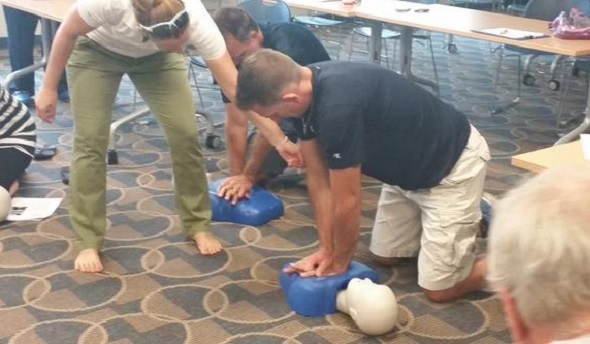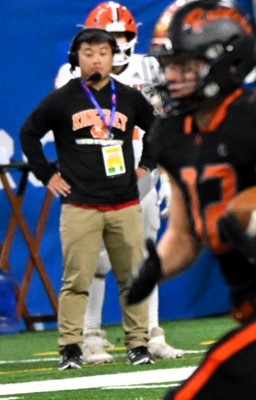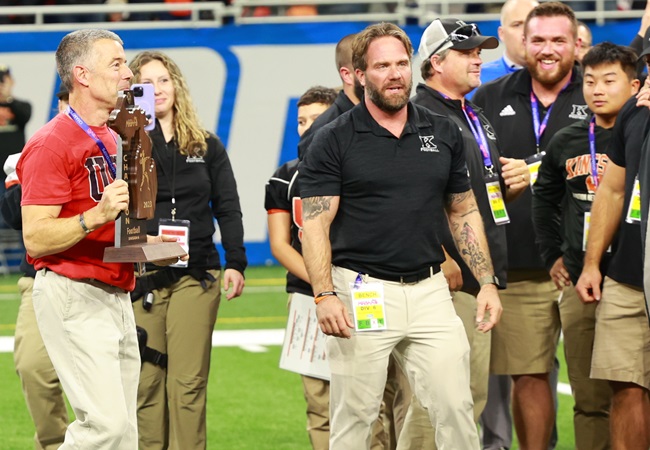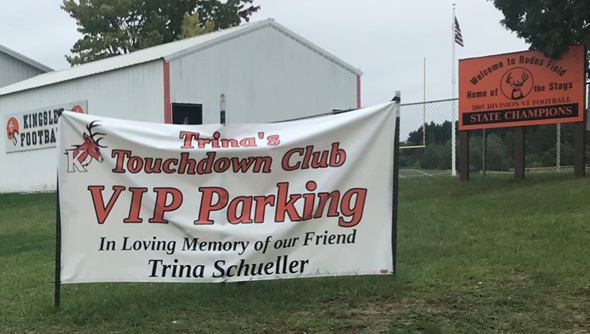
CPR Training, CAP Add to Preparedness
By
Geoff Kimmerly
MHSAA.com senior editor
October 12, 2015
A recent graduate from Ovid-Elsie High School named Chris Fowler started classes this fall at Michigan State University, his days representing the Marauders on the basketball court, football field and golf course now memories as he starts the next chapter of his young adult life.
But his story also will remain a reminder as his high school’s athletic department prepares each year to keep its athletes as safe as possible.
Three years ago next month, Fowler collapsed on the football practice field in cardiac arrest. The then-sophomore was brought back to life by two of his coaches, who revived him with CPR and an AED machine.
There’s no need for athletic director Soni Latz to recount the events of that day when explaining the importance of being ready to respond to a medical crisis – her coaches are well aware of why Fowler survived and understand completely why they too must be prepared.
“Everyone is very aware of what happened and the importance of being trained and knowing what to do, and actually feeling comfortable to step in and administer CPR when needed,” Latz said. “You can feel it’s never going to happen to you, but once it has, it makes you more aware and conscientious to be prepared.”
But Fowler’s story is worth noting on a larger level as varsity coaches at all MHSAA member schools are required this year for the first time to become certified in CPR, and as the largest classes in Coaches Advancement Program history begin course work that includes up to four modules designed to make them aware of health and safety situations that may arise at their schools as well.
The CPR requirement is the most recent addition to an MHSAA thrust toward raising expectations for coaches’ preparedness. The first action of this effort required all assistant and subvarsity coaches at the high school level to complete the same rules and risk minimization meeting requirement as high school varsity head coaches beginning with the 2014-15 school year.
The next action, following the CPR mandate, will require all persons hired as a high school varsity head coach for the first time at an MHSAA member school after July 31, 2016, to have completed the MHSAA’s Coaches Advancement Program Level 1 or Level 2.
In addition, MHSAA member schools this summer received the “Anyone can Save a Life” program, an emergency action plan curriculum designed by the Minnesota State High School League to help teams – guided by their coaches – create procedures for working together during medical emergencies.
“Coaches get asked to do a lot, and even if a school has an athletic trainer or some other health care professional, that person can’t be everywhere all the time. Coaches often are called upon to be prepared for (medical) situations,” said Gayle Thompson, an adjunct assistant professor at Albion College who formerly directed the athletic training program at Western Michigan University and continues to teach CAP sports medicine modules.
“The more (coaches) can learn to handle the situations that can inevitably arise, the better off they’re going to feel in those situations and the better care they’ll be able to offer their athletes. It’s proven that the faster athletes are able to get care, the quicker they’re able to come back to play.”
 Pontiac Notre Dame Prep – which has sent a number of coaches through the CAP program – began a focus on heart safety about five years ago after a student-athlete was diagnosed with a heart issue that allowed her to continue to play volleyball and softball, but not basketball. Athletic director Betty Wroubel said that prior to the student’s diagnosis, the school did provide training in CPR, AED use and artificial respiration; however, that situation put coaches and administrators further on the alert.
Pontiac Notre Dame Prep – which has sent a number of coaches through the CAP program – began a focus on heart safety about five years ago after a student-athlete was diagnosed with a heart issue that allowed her to continue to play volleyball and softball, but not basketball. Athletic director Betty Wroubel said that prior to the student’s diagnosis, the school did provide training in CPR, AED use and artificial respiration; however, that situation put coaches and administrators further on the alert.
Her school offers CPR training also to subvarsity and middle school coaches, using a combination of video instruction from the American Red Cross and in-person guidance by members of the school community who are certified to teach those skills. Students at the school also have received training – and it paid off a few years ago when one of them gave CPR to a baby who had stopped breathing at a local shopping mall.
Portage Central scheduled two sessions this fall for its coaches to receive not only CPR certification, but AED training as well. Central was fortunate to have an American Red Cross first-aid trainer in house, teacher Rachel Flachs, who also is close to the athletic side as the girls swimming and diving coach at Mattawan High School.
Central athletic director Joe Wallace said the training was offered not just to varsity head coaches, but every head coach on every level of the program so that “at least we know that at every given practice, every game, we’d have someone recently trained,” he said.
And he was proud of how his coaches immersed themselves in the subject matter.
“They were putting themselves in scenarios to see how it related to their own sports and asking really great questions,” Wallace said. “It was thought provoking.”
The CAP sports medicine modules are designed to do the same as coaches consider the medical situations they could face. They aren’t designed as “medical training,” said Tony Moreno, a professor of kinesiology at Eastern Michigan University and teacher of all four CAP sports medicine modules. Rather, attendees receive an awareness and basic education on common injuries, injury mechanisms and prevention, and how to create an action plan in the event of an injury incident.
The CAP program touches on a variety of safety topics in several of the available seven levels of coach education.
CAP 1 – which is part of the mandate for new coaches beginning next school year – includes “Sports Medicine and First Aid.” Cap 4 has modules titled “Understanding Athlete Development” and “Strength and Conditioning: Designing Your Program.” CAP 5 includes the session, “Peak Health and Performance.” Attendees also have the option of receiving CPR and AED training as an addition to some courses.
With a quick Internet search, coaches have no trouble finding a variety of resources on sports medicine, performance enhancement, nutrition and healthy living regarding young athletes. “However, some of these sources are more credible and scientifically-based in comparison to others,” Moreno said. “CAP strives on an annual basis to continue to update and improve the quality and credibility of this information and in a face-to-face manner where coaches have the opportunity to ask questions about their experiences and specific programs.”
“Having the CAP requirement will only make them better informed. Many have had this kind of information before, but there’s always something new coming,” Thompson added. “I think we do a good job, not of trying to tell them they were wrong, but maybe taking what they’ve known a step further and making them better prepared – empowering them to do their best.”
Wroubel may understand more than most athletic directors the growing list of tasks coaches are asked to accomplish; she’s also one of the winningest volleyball and softball coaches in MHSAA history and continues to guide both Fighting Irish programs.
But she and Wallace both said the CPR mandate isn’t considered another box to check on a to-do list; there’s enthusiasm because of its importance and the opportunity to carry those skills into other areas of community life as well.
Wroubel has served as a coach since 1975 and said this renewed emphasis on coaches having knowledge of sports medicine actually is a return to how things were when she started. Back then, coaches were responsible for being that first line of medical know-how, from taping ankles to providing ice and evaluating when their athletes should make a trip to the doctor’s office.
“When I first started coaching, we didn’t have sports medicine people, trainers, or team doctors other than for football. You did everything yourself,” Wroubel said. “I think everybody got away from that, but I think it’s coming back because a trainer can’t be everywhere.
“It’s healthy and it’s good for kids. … The more of us with emergency skills, the better we’re able to serve our community.”
PHOTOS: (Top) Portage Central coaches receive CPR training earlier this fall. (Middle) Pontiac Notre Dame Prep coaches practice during AED training. (Photos courtesy of school athletic departments.)

Football Title Reflects Kingsley's Current Success, Recalls Loved Ones Passed
By
Tom Spencer
Special for MHSAA.com
December 1, 2023
Kingsley football fans have become pretty familiar with VIP parking for home games over the last couple of seasons.
 They may just start looking for a Kingsley VIP lot at Ford Field. The Stags just captured the MHSAA Division 6 championship trophy with a 38-24 victory over Almont, their second Finals championship and first since 2005.
They may just start looking for a Kingsley VIP lot at Ford Field. The Stags just captured the MHSAA Division 6 championship trophy with a 38-24 victory over Almont, their second Finals championship and first since 2005.
The road to the Finals started with Kingsley hosting two playoff games, allowing great use of the VIP Parking of Trina’s Touchdown Club. The lot is adjacent to the school’s Rodes Field and provided in loving memory of Katrina “Trina” Kay Schueller, who passed away Oct. 21, 2021, at Munson Medical Center.
Those playoff games filling Trina’s Touchdown Club’s parking lot featured wins over Mason County Central 61-12 and Manistee 37-18, and 51-27 over Gladstone in the Regional Final. Kingsley then traveled down the road and defeated Reed City 37-7 in the Semifinal.
There may not have been designated VIP parking in Cadillac and Ford Field for the Stags’ followers, but there were a lot of VIPs at both stadiums with Schueller on their minds. Pretty much everyone with an affiliation with the highly-successful program or familiarity with the community’s struggles have become VIPs to the Kingsley coaching staff and many others.
Most certainly among the VIPs are head coach Tim Wooer, assistant coach Conner Schueller, his brother Carter Schueller, and his father Mike Schueller.
Conner was set to play the biggest regular-season game of his career the day after his mom passed. It was the regular-season finale against rival Traverse City St. Francis.
Wooer vividly remembers the moments leading up to that matchup, noting how difficult it was for Conner. But his then-fullback and now-assistant coach demonstrated amazing strength and maturity he stills exhibits today.
 “He’s in his senior football season, and his mom is in the hospital for four weeks — he’s balancing that playing football and going to school,” Wooer recalled. “And then she passes, and he has the strength to come back to school and deliver the news to our team.
“He’s in his senior football season, and his mom is in the hospital for four weeks — he’s balancing that playing football and going to school,” Wooer recalled. “And then she passes, and he has the strength to come back to school and deliver the news to our team.
“I am sobbing watching this kid, and I’m just amazed,” Wooer continued. “The next night is Parents Night, and he’s on the field with his dad and brother without his mom.”
Conner still played, making a 4th-down goal line tackle to prevent a St. Francis touchdown. The Gladiators won the game, but Conner won the day, conquering much just to dress for the game.
The Stags went on to playoff wins over Kingsford 28-10 and Clare 32-6. They bowed out with a 33-18 Regional loss to Frankenmuth.
Conner’s junior year of 2020 had been cut short as the Kingsley was forced to forfeit its District Final to Reed City because several players and coaching staff tested positive for COVID-19. The Stags had Ford Field in their minds that season too after playoff wins over 38-13 Standish-Sterling 38-13 and Gladwin 63-16.
Conner, who celebrated his 20th birthday at Saturday’s Final, remembers his playing days and the challenges presented him.
“At the time it was ‘she’s not there,’ especially my senior year she wasn’t there to watch me and finish it out, but I know she’s watching above,” he said. “We were about to go play Reed City my junior year for Regionals, and everyone got sick and it ended our season unfortunately.”
Those challenges were on his mind at Ford Field, and running through his mind when he saw his brother and father in the stands. Carter, now a senior at Kingsley, had been unable to play football due to injuries.
“I thought about my brother – he unfortunately didn’t play this year due to his injuries, and I don’t really blame him for that,” Conner said. “I thought about him as well because it was just me and my dad and my brother now.
“It was very emotional,” Conner continued. “I got a glimpse of him in the strands.”
Carter also was filled with gratitude for the coaching staff for welcoming and mentoring him. He had become keenly aware of the amount of time coaches spend away from family at practices and going through film.
In addition to his family, Conner was thinking about many others in the Kingsley community – and other senior classes like his that didn’t get the chance to celebrate a championship.
He also was thinking about Justin Hansen, a 2003 graduate of Kingsley. Hansen was a captain on the 2002 conference championship team. He went on to become a special-operations Marine sergeant and was killed in action July 24, 2012, while deployed in Afghanistan. Hansen was on patrol as part of an operation in search of a high-value target when his team was hit with small arms fire.
 On Saturday, Wooer was wearing a red T-shirt with the letters “USA” on the front and the name “Hansen” on the back. It also featured the number 54, Hansen’s in high school.
On Saturday, Wooer was wearing a red T-shirt with the letters “USA” on the front and the name “Hansen” on the back. It also featured the number 54, Hansen’s in high school.
Wooer, who turned 54 in July, wore the shirt in Hansen’s memory knowing Hansen would be on the veteran coach’s mind and symbolizing Hansen’s presence with the team at Ford Field.
Wooer wants to make sure Hanson is never forgotten and reminds the soldier’s family the entire community remains behind them.
“I believe it is part of our job as a community to show our love to this family and help in any way possible to help them get through this process,” Wooers said. “After the funeral, we all went about life.
“We certainly still think about Justin and feel the pain,” he continued. “But nothing like a family does.”
Hansen’s tragic passing led to the creation of the annual Patriot Game in Traverse City in 2012 while Wooer was coaching Traverse City West. The game features crosstown rivals West and Traverse City Central every year and strives to honor veterans, first responders, active duty military, and area heroes who died while serving their country.
Saturday’s win over Almont left Wooer emotionally exhausted after all the preparations to do it right for the senior class, the school, the Kingsley community, the Schueller family and Hansen. Collectively, they’ve really become more like a family to the Stags coaching staff and many, many others.
“In terms of emotions, there is no doubt Justin was on my mind throughout the game,” Wooer said. “Trina and Conner have been – those are two huge pieces.
“And, a lot of my thoughts are with the seniors,” he continued. “You want to win the game, but also it is your last time with them.”
Wooer has learned a lot from his former players and coaches over the years. He’s become close friends with many of them, going back to his early days of coaching as a student-teacher at Elk Rapids. He also coached at Farewell and Traverse City West, the latter from 2008-2017 after a first tenure at Kingsley. He returned to Kingsley in 2018.
Schueller is among several former players and coaches who have been on Wooer’s coaching staffs over the years. Several continue today.
“I could give you lots of other stories about kids I have had,” Wooer said. “There comes this transition where they turn into such amazing men, you catch yourself every once in a while saying, ‘I want to be like him.’
 “You get this huge smile on your face because you’re so proud of them, just like a mother or father would,” Wooer continued. “A coach always looks at his players like they’re part of his family.”
“You get this huge smile on your face because you’re so proud of them, just like a mother or father would,” Wooer continued. “A coach always looks at his players like they’re part of his family.”
In addition to Conner, current assistants with long-term relationships with Wooer are Tom Kaleita, Kyle Smith, Ryan Zenner, Dan Goethals, Josh Merchant, Jordan Bradford, Steve Klinge, Connor Schueller, Mike Arlt, Larry Mikowski, Bobby Howell, Rob Whims and Jason Morrow.
This year’s seniors were Jon Pearson, Eli Graves, Skylar Workman, Gavyn Merchant, Max Goethals, Evan Trafford, Bode Bielas, Grant Kolbusz, James Person, Caleb Bott, Trenton Peacock, Noah Scribner and Gavin Dear. They and the coaching staff will be the center of attention as the community celebrates the football team at 7 p.m. this evening in the high school gymnasium.
The seniors probably won’t need VIP parking tonight. But if it would help, Conner would surely make arrangements to utilize Trina’s Touchdown Club. He’d have to add a shuttle though as Rodes Field is about a mile away from the school.
“It feels amazing — I don’t think it really hit any one yet, but I am sure it will,” Conner said. “After we won, it is truly something – it is something else I can’t explain.
“The seniors finally won it the way they were supposed to,” he continued. “It was a good class of seniors.”
 Tom Spencer is a longtime MHSAA-registered basketball and soccer official, and former softball and baseball official, and he also has coached in the northern Lower Peninsula area. He previously has written for the Saginaw News, Bay County Sports Page and Midland Daily News. He can be reached at [email protected] with story ideas for Manistee, Wexford, Missaukee, Roscommon, Ogemaw, Iosco, Alcona, Oscoda, Crawford, Kalkaska, Grand Traverse, Benzie, Leelanau, Antrim, Otsego, Montmorency, Alpena, Presque Isle, Cheboygan, Charlevoix and Emmet counties.
Tom Spencer is a longtime MHSAA-registered basketball and soccer official, and former softball and baseball official, and he also has coached in the northern Lower Peninsula area. He previously has written for the Saginaw News, Bay County Sports Page and Midland Daily News. He can be reached at [email protected] with story ideas for Manistee, Wexford, Missaukee, Roscommon, Ogemaw, Iosco, Alcona, Oscoda, Crawford, Kalkaska, Grand Traverse, Benzie, Leelanau, Antrim, Otsego, Montmorency, Alpena, Presque Isle, Cheboygan, Charlevoix and Emmet counties.
PHOTOS (Top) Kingsley students support their classmates during Saturday’s Division 6 Final at Ford Field. (2) Stags assistant coach Conner Schueller watches from the sideline during an Almont run back. (3) Kingsley coach Tim Wooer, in red, prepares to present the championship trophy to his team including Schueller, far right. (4) Trina’s Touchdown Club welcomes members to the VIP lot adjacent to the Kingsley stadium. (Ford Field photos by Hockey Weekly Action Photos; touchdown club photo courtesy of the Kingsley football program.)

